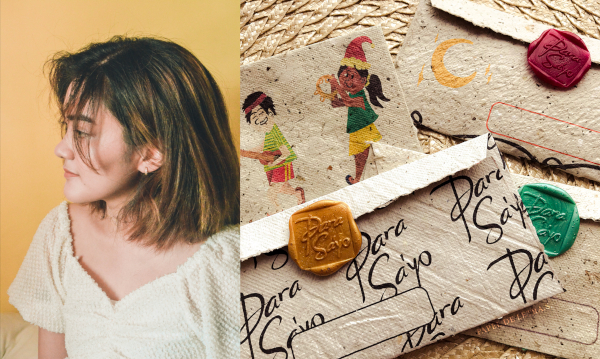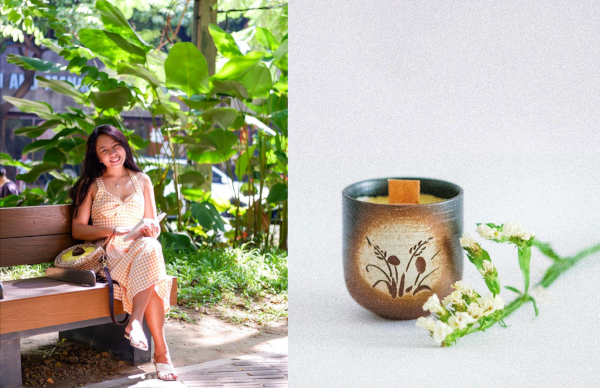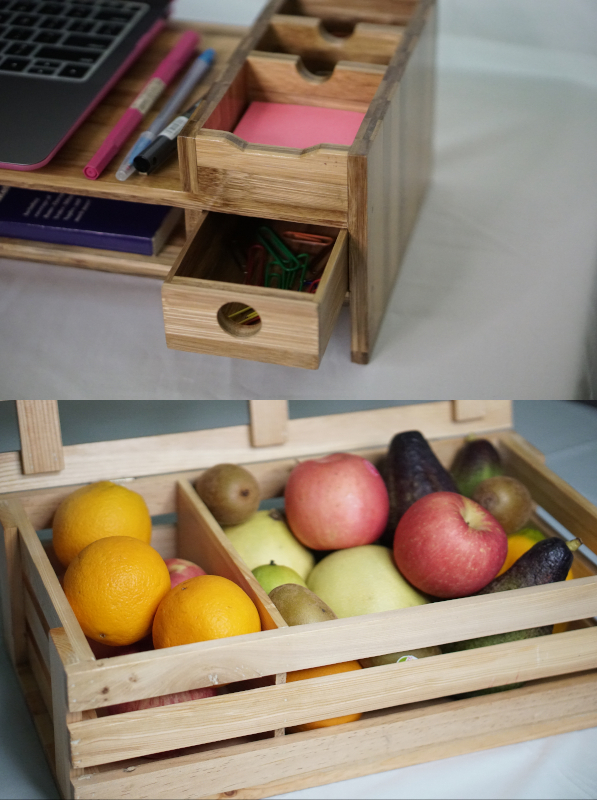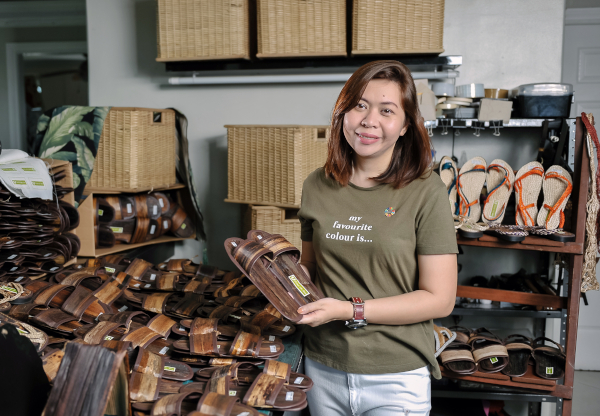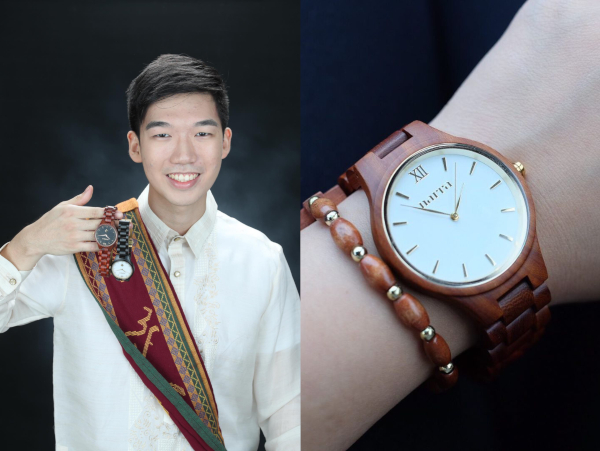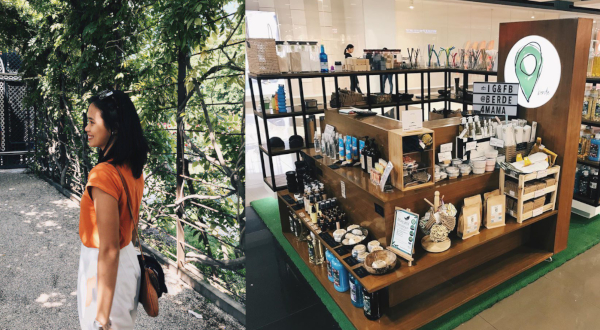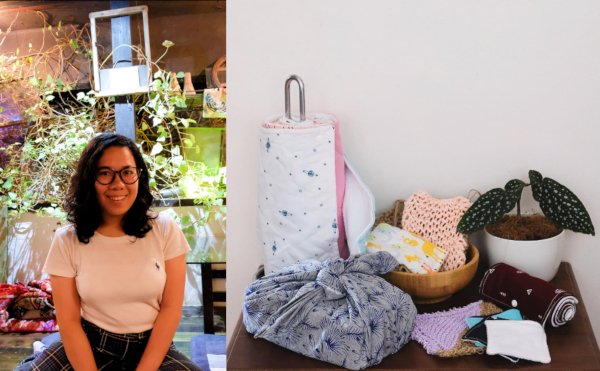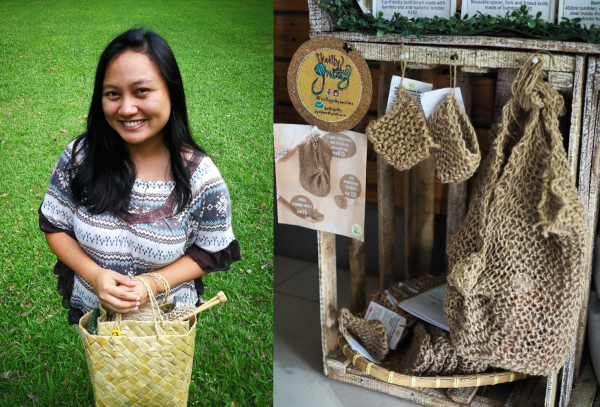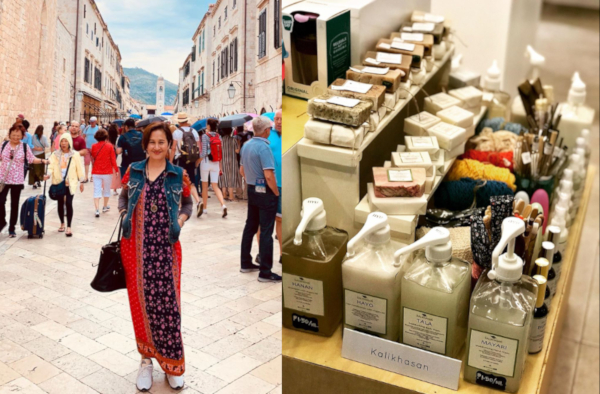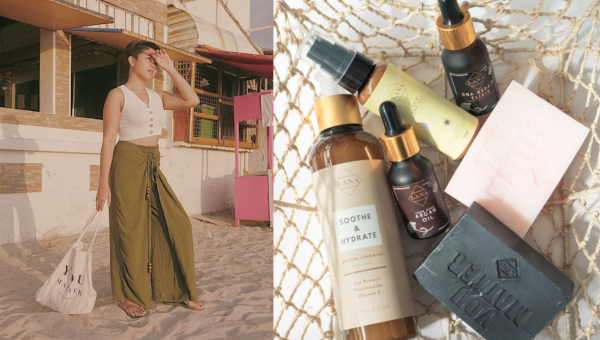Becoming an eco-entrepreneur is one of the most powerful things that we can do to spark a much-needed positive change in our world, which is why we salute all those who have taken such a responsibility to influence the rest of us to make greener, more mindful, and more sustainable lifestyle choices. Here is a list we curated of some of the many Filipino eco-entrepreneurs who are inspiring us every day to make the switch.
22. Wilma Torralba, 41, @wilmavtorralba
EcomommmaMNL
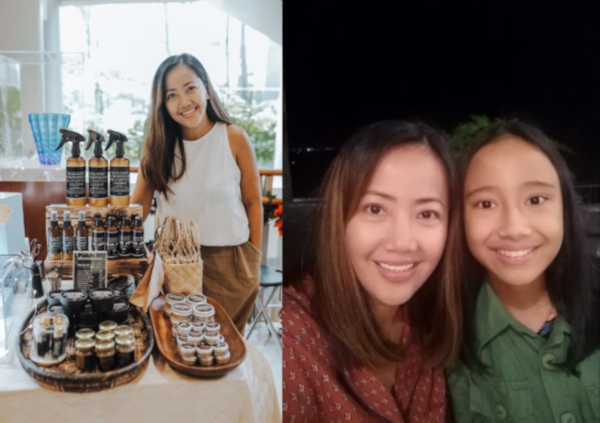
What’s your advocacy and its significance? ECOMOMMMAMNL is a passion project that aims to provide handmade all-natural personal and home care products. In a world full of overconsumption with so many choices we tend to forget about being mindful — to choose simply and to stay natural. This mom’s advocacy is simple — to create what’s best for her child.
What do you hope to accomplish? To change the mindset of every Filipino about all-natural choices, to disrupt the conventional brands we are used to and be accessible widely so that going green will never be a struggle and most importantly affordability.
What are the challenges you are facing? In my own experience, from the bazaars I’ve joined the past few months, it’s the CONSUMERS MINDSET. Not everyone is fully adaptable to switch to a chemical-free lifestyle or probably lack of awareness of it.
How can we, as Filipino consumers, realistically adopt a lifestyle that is more sustainable and less wasteful? Start from the basics from personal care products importantly — switch to an all-natural toothpaste, deodorant, shampoo, sanitizer and so on. Then, to our home care aids such as an all-purpose cleaner or laundry detergent and so on. If we cannot refuse plastic packaging, let’s think of a better way to reuse and recycle them before putting it into waste.
21. Joane Fides, 22, papeldeletra.s
Papel De Letra.s
What’s your advocacy and its significance? PAPEL DE LETRA.S. is my creative home crafting handmade and hand-painted stationeries and event invites. Its stationeries are made from dried leaves and recycled paper from scraps brought about by previous invitation clients.
I am an advocate of handmade crafts & stationery, and of producing less waste. Combining the two, these allow me to nurture my talents and skills while being mindful of our environment. I use a lot of paper in my business so what better way to reduce waste is to not just upcycle paper scraps, but recycle them into new ones while using fallen dried leaves together.
What do you hope to accomplish? It may not have a huge visible effect, but at least I could teach or influence my clients (people) that recycled paper is still paper — beautiful and useful in its own way — while reducing paper wastes at least at my home/workplace. The wastes we produce can be brought back to life as something useful too.
What are the challenges you are facing? The biggest challenge for me is how people perceive handmade and recycled products. Although I am very happy to know that many people are actually very willing and appreciative to have products made by hand and/or recycled ones, there are still those who think these products are of no good. Some people think handmade/recycled products are out-of-style, old looking, weak and not very attractive, and that they would rather buy something cheap and easily disposable because other people will throw it anyway.
Second, are resources. My invitation paper scraps run off at some points, so there are times that I use some other paper scraps. Water is vital in the papermaking process, so as much as possible, I reuse it again and again even if it smells weird already (but the water doesn’t affect the smell of paper since the leaves serve as a strong fragrance). It is unrealistic to say that I make zero or no waste at all. However, I really do try my best to produce minimal waste as much as possible while creating my products.
The third is the weather. The rainy season and its unpredictability make it hard for me to dry off my handmade paper quickly. Sometimes it takes 3 days to dry off a batch which slows down my production time, causing me to sometimes use electricity which isn’t very cost- and energy-efficient.
How can we, as Filipino consumers, realistically adopt a lifestyle that is more sustainable and less wasteful? Just like living healthily, we have to admit that living a sustainable and less wasteful lifestyle requires more effort and can cost us more sometimes. We can start little by little. I grew up learning to clean up my own trash so ever since, whenever I have something I need to throw yet have nowhere near to put it, I keep it in my pocket until I find one or reach home. Or better yet, reduce buying stuff that will create excess wastes such as thin plastics or foils.
Another example is to use both sides of the paper. Your notes can still look good, and you can save the rest of your pad/notebook for future use. And once you’re through and through, upcycle it! Sell it to a junk shop where they can send it off to a recycling shop/factory or donate them to groups/shops that recycle paper, like PAPEL DE LETRA.S.!
And lastly, use it while it can work. Take care of your things well so they could last longer. We don’t have to buy new stuff all the time. Reuse things or upcycle. This act itself produces lesser waste, lesser carbon footprint and helps you save money too!
There are many other ways to live sustainably or produce fewer wastes but I believe these 3 are commonly overlooked because they don’t seem big enough to create a change, when in fact all big things and changes grew from something small.
20. Henry James Sison, 45
Agronegosyo / Agro-Digital PH
What’s your advocacy and its significance? Agro-Digital PH aggregates groups of farmers, usually small and medium landholders, consolidating their assets and capabilities to empower farmers and enable them to build a sustainable digital business. Agronegosyo.com is our commerce portal and just one of our suite of applications in our Agro-Digital PH platform.
The established food value chain is keeping farmers poor, perpetuating an almost feudal food ecosystem (poor farmers are becoming poorer). Farmers do not have access to the market. Production by individual farmers vary in volume, quality, and availability making it difficult to adhere to high volume, long term contracts. Inefficiencies in the value chain are reducing farmers’ incomes and consumers bear the brunt of higher food prices.
Agro-DigitalPH was established to digitally enable farmers, leveraging the power of digital to improve farmers’ incomes and consequently uplift their lives.
What do you hope to accomplish? We hope to educate farmers to use digital and run their farms as a business. Running the business as a collective strengthens farmers’ ability to do business and play toe-to-toe with the more established entities in the value chain. We want to be the great equalizer.
What are the challenges you are facing? Farmer education on digital is a long arduous process but there are farmers who are already sick of the status quo and embrace the technology as a Godsend. Breaking the usual channels for their produce i.e. middlemen / byaheros who traditionally buy their goods at low farm gate prices is a journey that involves acceptance that there is a different and better way of doing business.
How can we, as Filipino consumers, realistically adopt a lifestyle that is more sustainable and less wasteful? First, choose to buy locally harvested produce! Help farmers stay in agriculture. When you deliberately choose local produce over imported ones, you help break the cycle of poverty.
19. Yza Tolentino, Yza Tolentino, 24, @yzatolentino / @sunnylabel
Sunny Label
What’s your advocacy and its significance? I create hand-poured candles in up-cycled ceramic jars. I only use beeswax from a local family bee farm. Unlike other beekeepers, they put bees first and only harvest every quarter and only if there are excess. Supporting local beekeepers is very important in ensuring the survival of honey bees given that a lot of plants are being stripped off for commercial purposes. I also only source essential oils from a family business to support other local initiatives like mine.
What are the challenges you are facing? I think the biggest challenge is pricing the products and communicating them to the market. There are a lot of cheaper alternatives out there like those made of paraffin wax or artificial fragrances that are not best for one’s health. So it’s a matter of making it clear to people that the materials used are very important. I also only make small batches of candles and allow refills for less waste.
How can we, as Filipino consumers, realistically adopt a lifestyle that is more sustainable and less wasteful? I think the best way to adapt a more mindful way of consumption is to ask ourselves “Why am I buying this?” and really dig deep. It opens a lot of qs like whether you really need it or if there are other alternatives out there that are less wasteful
18. Rei Tugade, 33, @ balaikamayph
Balai Kamay
What’s your advocacy and its significance? I grew up in Baguio where I enjoyed my childhood, playing in the parks, and with the pine trees. At that time, Baguio was the cleanest and greenest city so I had been exposed to local initiatives of recycling and reusing at a young age. In school, I joined several tree planting activities. Even at home, my mother taught us how to take care of the clutter in the house. Since then, we have been segregating items that can be further reused, for donation or for selling to the junk shops. My father also kept and maintained a small backyard then where we make our own compost from our food peelings. From the family, to school, and to the greater community where I belonged, I got used to a lifestyle that is mindful, intentional and compassionate to nature.
What do you hope to accomplish? In my own simple ways. I hope I can encourage others to embrace the responsibility of making conscious decisions to protect the environment for the next generations to see and enjoy.
What are the challenges you are facing? As BalaiKamay uses recycled and sustainably sourced materials, it is our constant struggle to be consistent with this, despite intense competitive heat in trade to use lower-cost substitutes and practices that may be non-eco-friendly.
How can we, as Filipino consumers, realistically adopt a lifestyle that is more sustainable and less wasteful? s Filipinos, we can truly adopt a lifestyle that is more sustainable and less wasteful. It has to start with us, appreciating the beauty of the environment. We can take a break from our busy schedules and bring our loved ones to the beach, climb up a hill or simply enjoy a picnic at a nearby open park. When we are reminded how blessed we are to enjoy all these God-given natural resources, we can be encouraged and moved to want to preserve these for the longest time possible. After all, it’s natural for us to take care of things that are precious and valuable to you.
17. Camille Rose Duque-Albarracin, 39, @greenelas.ph
Gree-ne-las PH
What’s your advocacy and its significance? Gree-ne-las (the first-ever greener alternative, fully compostable slippers, Filipino Brand) is the first project by Everything Green (a social enterprise) that would revolutionize the hospitality industry by incorporating sustainability in the major business processes from procurement until disposal and achieve the model of circular economy and at the same time impact the lives of farmers, artisans, and makers from the marginalized community in Bicol including the Kabihug tribe (indigenous tribe) and Persons with Disabilities in Quezon City.
What do you hope to accomplish? More than recognition and the accolades of the brand, our major accomplishment is the direct impact of uplifting the lives of the marginalized communities. This project has currently impacted the lives of the artisans or makers from the marginalized community of 32 families in Bicol including the Kabihug tribe (The Kabihug tribe is one of the surviving minorities in Bicol) and 31 families from the Persons with Disabilities in Quezon City, Metro Manila. It takes two communities to make a pair of “Gree-ne-las” before it reaches the hotel guest room. We also look after the wellbeing of our artisans as we practice ethical production and fair trade.
What are the challenges you are facing? We are trying to convince hotels to do an eco-switch as we are directly competing with current big players and, usually, hotels’ decisions are hugely based on price rather than the value it offers. As an early-stage start-up social enterprise, we are still looking for ways to streamline our processes and lower down production costs and be able to meet the quantity, quality and be able to be price competitive. This would entail financial resources and further research and development. We are also trying to strike a balance between maintaining social and environmental impact and being able to sustain the business in the competitive market.
How can we, as Filipino consumers, realistically adopt a lifestyle that is more sustainable and less wasteful? Awareness is the key. We have to understand our whys first before we could adopt a sustainable lifestyle. Being aware of where our trash goes and realizing the negative effects on the environment, especially when our nation has directly experienced strong typhoons and flooding.
16. Kelvin Yu, 23, @narra.watches
Narra Wood Watches
What’s your advocacy and its significance? As an eco-entrepreneur, I am an advocate of both entrepreneurship and of taking care of the environment. I started my business when I was in college as a wild idea, and to my surprise, I really enjoyed and learned a lot from it, and I think trying out side-hustles can make us learn and grow so much as people. I’m also an advocate for the environment because we only have one earth, one planet, and we really should be doing a better job of taking care of it for future generations.
What do you hope to accomplish? I hope to grow my business and my brand, Narra Watches, to become one of the biggest watch brands here in the Philippines. I also hope that when the brand gets big enough, I can give back to the environment through other environmental advocacies, so that I can do my part to make the earth greener.
What are the challenges you are facing? Growing the business is always a challenge, and so is getting people to know about it. Time management is also a challenge as I juggle the business together with a full-time job. But I love doing the business as a passion project of mine and I love learning, so I’m always going to chase opportunities for me to learn and grow.
How can we, as Filipino consumers, realistically adopt a lifestyle that is more sustainable and less wasteful? Changing lifestyles isn’t easy, although it can be done gradually, so try to start making small changes. My mom used to always scold me whenever I would accept a paper/plastic bag from stores I was shopping from, and we’d end up returning the bag in favor of placing our purchases in an ecobag that she would always bring around. So first is to be conscious of your habits that may negatively affect the environment, and second, start with small changes that you can do to help. Remember, small changes can make a lasting impact.
“We don’t need a handful of people doing zero-waste perfectly. We need millions of people doing it imperfectly.” – Anne Marie Bonneau
15. Jaye Aliyah A. Ong, 24, @berde4mama
Berde
What’s your advocacy and its significance? With Berde, I support local and small-time businesses that also advocate for the environment. Most, if not all, my partners are local brands. I feel strongly about putting a prime on local businesses because they also hire and provide support for local communities, farmers, even working students. I also have partners who are stay-at-home moms. I choose to support these businesses because not only do we share the same hopes for our environment, but also for our local community. I hope that the help we’re trying to give them helps their lives in even the smallest ways.
What do you hope to accomplish? With Berde, I hope to introduce to the mainstream market the eco-friendly alternatives that are available for use. We strive to make these items affordable in the hopes of encouraging everyone to make the shift because there are a lot of reusable items that would require you to commit to a certain lifestyle–and I hope that our prices are reasonable enough to nudge our customers into that thinking that they’re willing to try it out and if it doesn’t suit them, at least they didn’t spend a fortune trying.
I hope to start a community that strives to adopt a more sustainable lifestyle. We have refillable stations in our kiosk at SM that carry household items like dishwashing soap, laundry soap, fabric conditioner, cleaners, etc. When we first started, the refilleries weren’t getting much attention. People didn’t really have their own containers then, but now in our third month, the movement of our refilling stations has been promising. It’s these little wins that get me going.
What are the challenges you are facing? It’s challenging but very fulfilling to educate potential customers and passersby in our store. We get a lot of people asking why do they even have to reduce their waste. Some also comment that reducing your waste is just a big fad.
At our store in SM Southmall, we re-purpose old magazines and make them into bags, and also re-use paper bags from other stores. From this effort to reduce our consumption of buying new paper bags, we get a lot of comments that our packaging isn’t branded; or that it’s a bit crumpled; or that it’s too simple. However, we stand up for reducing waste. That’s the whole purpose of my business after all. It might be a small thing, but I believe it makes a big difference. The magazines would just really end up in the trash anyway, so at least before it does, we get to re-purpose them into bags, which prolongs their life a little bit.
How can we, as Filipino consumers, realistically adopt a lifestyle that is more sustainable and less wasteful? We need more people to care. We need a government that pushes for these changes. We need more avenues for people to learn about the negative impacts their wastes are creating, and at the same time provide platforms that can help them shift their lifestyle. Platforms such as seminars, affordable stores, workshops, etc.
But actually, it really all boils down to your commitment as a citizen of this world. The change doesn’t have to be so big and so drastic. In your own small ways, you can already reduce your waste even without purchasing anything new. You don’t need a metal straw to be able to say no to a plastic one from a restaurant — you can just drink directly from the cup. You don’t need a bamboo utensil for your baon — you can just bring the one you already have at home. It’s all about being conscious of the current situation of our environment and the depths we’re willing to go to to make this world a little better. (That last line seems a little too ambitious but it’s really not! Even the smallest step towards a more sustainable lifestyle will make a difference.)
14. Czareena Macaspac, 24, @dailyconvosshop / @convosofus
Daily Convos Shop
What’s your advocacy and its significance? “Starting sustainable conversations for a healthier home for the Earth.” has been my tagline since I started Daily Convos Shop and up to this day, me and my team believe that in order to make the Earth a better place to live in, we have to start creating mindful decisions within ourselves and our home. The line’s importance just goes a long way to opening new doors of understanding our natures movements and how we can help regain its power back, we as humans have destroyed it for so long already but if we try to continuously move and live for the world maybe there’s still hope in saving it.
What do you hope to accomplish? As an individual and for my shop, I truly hope to teach a lot of people to create their own home alternatives. I want my shop to just be an inspiration for a lot of people on where hopefully in the future we can just help each other grow, create, and learn new things that will not only make the world a better place but also make each other’s lives easier through sustainability.
What are the challenges you are facing? For Daily Convos Shop, it has always been our goal to offer affordable Earth-friendly products but due to the constant price hike of the raw materials and of course we also do not want to just create sustainable alternatives without studying everything that we use, we can’t help but make our products’ prices higher too. This now leads to cheaper alternatives or options that are not a hundred percent plastic-free. For my personal life, one challenge that I am really facing is the vehicular carbon footprint that I consume, I travel from time to time but whenever I am here I tend to use my private vehicle a lot too due to the poor public transportation in the country. Right now, all I can do is look for ways on how to carbon offset and what else I can do for my daily life.
How can we, as Filipino consumers, realistically adopt a lifestyle that is more sustainable and less wasteful? Always use the resources that are available in your own home because reusing and upcycling are always better than buying something new. We always hear that we should be creative in adapting to the lifestyle but it is really needed in order to consume less. And aside from adapting I think the main thing that we should really take note of is we have to respect each other’s journeys and help educate the ones who need it the most.
13. Chiara Karenina Manuel, 24, @knittygrittybychiara
Knitty Gritty
What’s your advocacy and its significance? As a knitting kumares, we wake up for nature, women, children, rescue dogs and cats, and LGBTQIA who are all worth our hearts. We believe that our advocacies can be resonated by our skill –knitting – and the value of fair trade. We put a premium on the value of handmade and sustainably produced raw materials; we only produce according to the demand so nothing is put to waste.
What do you hope to accomplish? We hope humans will also see how important it is to put a premium in handmade and recognize each makers’ unique capability and leaving a part of him/her in what he/she creates.
We also wish to provide sustainable alternatives for household and body sponges. We aim to make the handknitted and compostable jute dishwashing scrubbies available, accessible, and affordable so more households can make the switch from plastic sponges which only lasts for two weeks or a month to the scrubbies that can last for an average of 6 months. Introducing alternatives will hopefully influence the market and the existing policies so big corporations will be made accountable and be challenged to keep up in providing sustainable products and services.
What are the challenges you are facing? As a start-up with limited capital, we struggle to expand our reach. Also, we have limited options in parcel-free shipping, especially when we are based in Laguna. This is why we prefer to send items in bulk and partner with stores all over the country so it will minimize parcel use for minimal purchases.
How can we, as Filipino consumers, realistically adopt a lifestyle that is more sustainable and less wasteful? It always begins with caring. When we start caring about the farmers behind every grain of rice we eat, workers behind every garment we wear, stray animals that might mistake our take out plastics as their next meal, and the next generation which might not experience the beauty of our country’s pristine beaches, it’s when we acknowledge that even our smallest actions affect everything around us that we will rethink our choices especially in what we consume.
12. Malou de Joya, 51, @ kalikhasan
Kalikhasan
What’s your advocacy and its significance? Our mission is simply to provide an earth-friendlier and a more sustainable lifestyle that’s gentler to the earth. Our products are ideal for people who want to lessen their carbon footprint and are willing to transform their lives to green living with eco-friendly choices, from the food they eat to the products they buy.
What do you hope to accomplish? I want to be able to contribute even the smallest share in making the world a better place to live in, not just for all of us alive today, but most especially for the future generation. When we practice what we preach, our children will take it from there and will do the same for their children. These small actions that many people already do today in helping to save the environment create ripple effects that are part of a big wave in a sea of efforts of human compassion. This is what I want to be able to do.
What are the challenges you are facing? Pricing is a challenge. Although the prices of our products are quite reasonable, generally all-natural products are not as affordable as commercially manufactured products simply because most all-natural products are handmade and ingredients carefully and sustainably sourced, which means, we also try to make sure that the ingredients used in making our products are not harvested in such a way that it depletes the resource or affects the growth or production of an ingredient.
Creating awareness can also pose a challenge. We have to face it, many are still accustomed to the use of single-use products which is a big source of trash, not just in the oceans but everywhere, even just on the streets. Products that contain harmful chemicals and toxins are still manufactured and used on a daily basis, and which are also harmful to the environment. Living a completely sustainable lifestyle is still hard to achieve. It entails a lot of patience and effort, and everyone has his or her own challenging journey to face to be able to get there.
How can we, as Filipino consumers, realistically adopt a lifestyle that is more sustainable and less wasteful? Awareness is one thing. Mindfulness is another. One may be aware but not mindful. Whether Filipino or not, I think we have to first be aware of the adverse effects of the use of chemical-based and single-use products. Once aware, then we can practice the art of mindful living. When we are mindful of what we do to and with other people, animals, plants, things, then most likely we will be mindful of the environment. Then that’s the beginning of living a sustainable lifestyle. The important thing is to be able to start. And take baby steps a day at a time.
11. Rizza Lana – Sebastian, 29, @rizzalana
Lana PH
What’s your advocacy and its significance? My core ethos is to be able to make low waste living accessible and affordable to the Filipino people while creating and supporting local and small businesses along the way.
What do you hope to accomplish? To raise awareness and make low waste living achievable for every single Filipino.
What are the challenges you are facing? It’s honestly the packaging. Being an online business, it’s really hard to balance the low waste lifestyle vs making our packaging secure. Right now, Lana PH offers refills in our physical stores, bazaars, and HQ, but most of our sales are online.
Instead of using bubble wrap, we are currently using kraft boxes and recycled shredded paper as fillers, but we still use plastic for our courier. Yes, there are couriers that offer plastic-free shipping, but with the unpredictable weather, you wouldn’t actually know if the package arrives to your client at a pristine condition.
Right now, we are making efforts in educating our clients about ecobricks, and we, together with our sister brand @lecatcoffeeshop, partnered with The Plastic Solution to be one of the ecobrick drop-offs.
It’s something we are constantly working tirelessly to figure out, and we are very much excited to tell you of course once we find a workaround.
How can we, as Filipino consumers, realistically adopt a lifestyle that is more sustainable and less wasteful? Buying less is definitely one of the most sustainable and less wasteful things you can change in your lifestyle. Only buy things you need and you’ll constantly use in the long run. You honestly don’t need to buy ALL the pretty “zero waste alternatives” you see on social media. Use the things you already have at home — cutleries, snack boxes, water bottles, etc.
If you really need to buy something, buy second hand — and if you reaaaally really need to buy a new one, choose quality over quantity.

